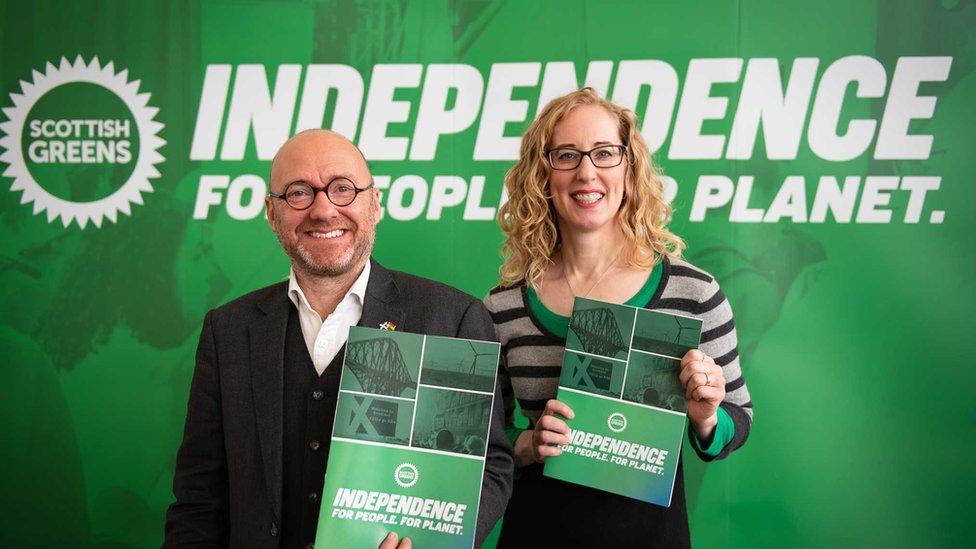Greens publish vision for Scottish independence
- Published

Co-leaders Patrick Harvie and Lorna Slater launched the paper in Edinburgh
The Scottish Greens have published the first in a series of papers setting out an alternative case for independence.
The Scottish government has already set out a number of documents outlining arguments for a proposed referendum on independence in October 2023.
The Greens are part of the government, but disagree with the SNP on policies including membership of Nato.
Co-leader Lorna Slater said the powers of independence would help shield Scots against "the worsening climate storm".
But opposition parties said the paper was "woefully light on detail", and that it was "embarrassing" for it to be launched during the COP27 climate conference.
The 11-page paper, published on Monday, was pitched as an overview of the Green case for independence.
It suggests that Scotland could be an independent republic and a full member state of the EU, using proportional representation in its elections.
It also says a Universal Basic Income scheme could be set up, alongside a four-day working week. And it says Scotland could ban new oil and gas developments, and become a "world leader" in environmental standards and protections.
However, there was no further detail about any of these policies, or costings for how they could be delivered.

The Scottish government has targeted a referendum in October 2023
Ms Slater said independence had moved from a matter of domestic policy to an "urgent, international imperative".
She said: "Scotland's independence debate has previously been about political perspectives, policy differences, the ideological approach towards putting the wants of the rich against the needs of the poor.
"That era has gone. Time has run out. This is now a matter of protecting our people and places against the worsening climate storm and ensuring we live our best lives as fairly and tolerantly as we can, in a country where nobody is left behind."
The Scottish Conservatives said the document was "barely worth the paper it was printed on", and that the Greens' plans were "simply unaffordable".
Constitution spokesman Donald Cameron said: "Like the SNP, they have no credible answers on what an independent Scotland would look like and are trying to pull wool over voters' eyes with plans that would be economically devastating."
The Scottish Lib Dems described the short paper as a "pamphlet" which was "embarrassing".
Leader Alex Cole-Hamilton said: "To be launching a fresh push for separation in the middle of COP27 says it all. None of the answers to the global problems we face can be found in a border or a flag."


This is not the weightiest of papers from the Scottish Greens - and it's not at all clear there will actually be a referendum next year for them to campaign in.
Neither of those things are really the point, though.
Part of this is about laying the groundwork for any future campaign; having put the process question in the hands of the Supreme Court in the hope that will move things along, the pro-independence side are now buckling down to the "why" of independence rather than the "how".
The other point is that the Greens are very keen to ensure they have their own unique space in the independence debate. As pleased as they are to be in government, they don't want to be swallowed up by it.
Nicola Sturgeon is currently at the COP27 conference, and has made the environment an increasingly key pillar of the SNP's argument for self-determination.
The Greens will feel this shows they are having influence at the heart of government - but equally won't want that to erase their selling point as the independence-plus-environmentalism ticket.
Essentially, they can't allow the first minister to out-green them.
Hence this signal that they are still around as an independent force, and that details will follow at some point about the ambitious policy platform they have begun to sketch out.